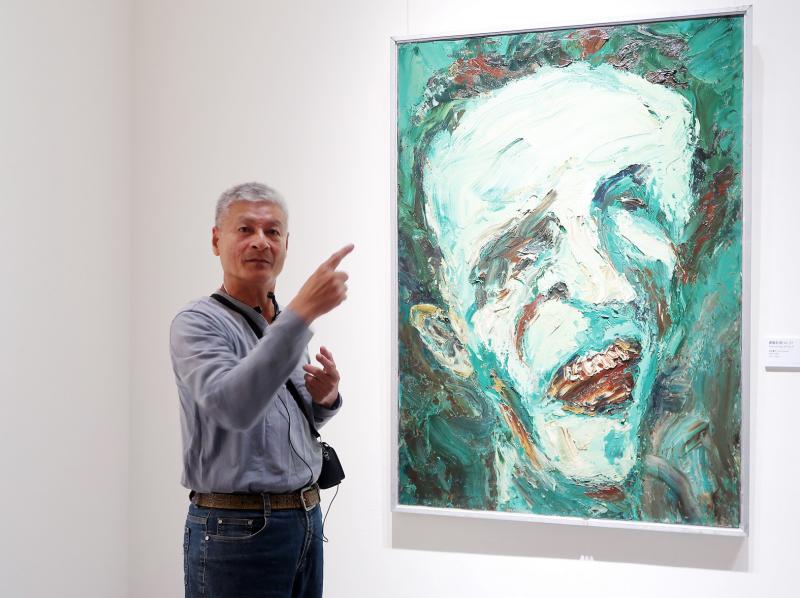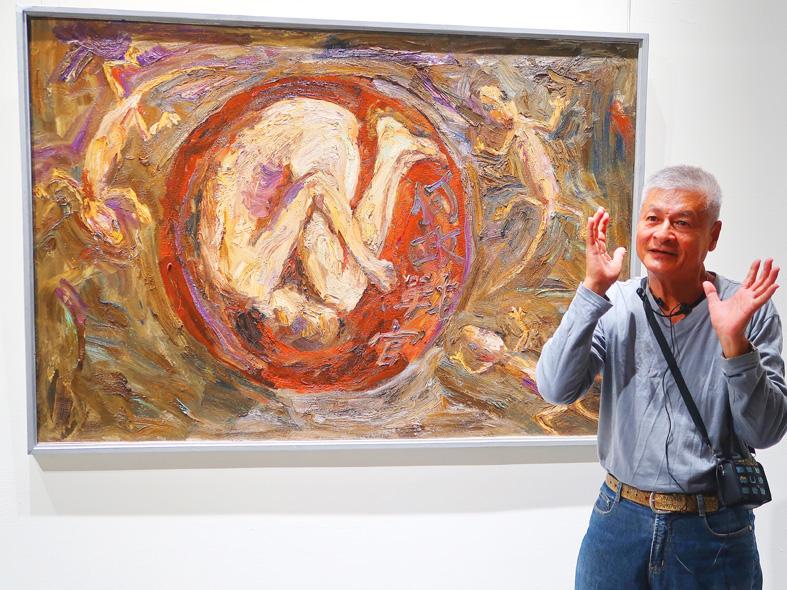An exhibit at Taipei’s Chiang Kai-shek Memorial Hall showcases work by artist Chen Wu-jen (陳武鎮), a survivor of the White Terror era.
At the age of 20, Chen was charged with sedition and jailed after scribbling anti-government phrases on the back of an aptitude test for new military conscripts as he was about to start his compulsory service.
Released two years later, Chen spent the next 20 years under government surveillance. During this time, he became an art teacher, but only painted portraits and landscapes out of fear of being imprisoned again.

Photo: Chen Yu-fu, Taipei Times
Recalling his prison experience, Chen said that one evening, he heard banging sounds from outside his room.
Later, he learned that a naval officer charged with sedition had died after being on a hunger strike, Chen said, adding that the banging sounds had been the man’s coffin being nailed shut.
In an interview with the Liberty Times (sister paper of the Taipei Times), Chen told about a teaching job he had at a remote elementary school.

Photo: Chen Yu-fu, Taipei Times
“Public transportation back then was not very good, and we had to walk about 40 minutes to get to the school. It was uncommon for teachers to bring family members back to the dormitory,” he said. “However, one female teacher brought her aunt to stay with her.”
It was only years later that he learned the government had told the female teacher to watch him, Chen said.
“About a week before I left that school to take a new teaching job in Tainan, she came to me and said: ‘My life was made miserable by you. I had to watch you, and the principal forced me to sleep with him.’”
The teacher told him that she had her aunt stay with her as a way to keep from being raped again.
Chen said that one teacher he met was imprisoned for eight years and, after his release, was forced to quit a job paving roads after only three days.
“The police had visited the boss and asked questions about the man, so the boss told him not to return to work,” Chen said.
After the lifting of martial law, Chen began painting works inspired by his experiences during the White Terror era.
Chen said that these stories and experiences inform the art he creates today, whether oil paintings, wood carvings or installations.
In some paintings, the force and direction taken by the scraper expresses emotion, while in others, the use of low-chroma grayscale tones conveys the haze of the victims, he said.
“In one piece I used a large, distorted blue-and-green face to represent those considered ‘social criminals’ in the eyes of the authoritarian regime,” he said. “Their criminal charges were unwarranted and fictitious.”
Another painting depicts the before and after of an execution conducted by a firing squad. The painting was inspired by the before-and-after photographs that prison authorities would take to show Chiang Kai-shek (蔣介石), to prove that they had carried out his orders.
“I have always felt that this shows that dictators themselves also live in fear. They are always worried about betrayal,” he said.
Chen said he hopes that the government would one day covert Chiang Kai-shek Memorial Hall into a national human-rights art museum, flanked on both sides by cultural parks.
“If such a museum is established, I will donate my works to its permanent collection,” Chen added.
The exhibit, which opened on Oct. 29, runs until Dec. 19.

A decision to describe a Chinese Ministry of Foreign Affairs statement on Singapore’s Taiwan policy as “erroneous” was made because the city-state has its own “one China policy” and has not followed Beijing’s “one China principle,” Deputy Minister of Foreign Affairs Tien Chung-kwang (田中光) said yesterday. It has been a longstanding practice for the People’s Republic of China (PRC) to speak on other countries’ behalf concerning Taiwan, Tien said. The latest example was a statement issued by the PRC after a meeting between Singaporean Prime Minister Lawrence Wong (黃循財) and Chinese President Xi Jinping (習近平) on the sidelines of the APEC summit

Taiwan’s passport ranked 34th in the world, with access to 141 visa-free destinations, according to the latest update to the Henley Passport Index released today. The index put together by Henley & Partners ranks 199 passports globally based on the number of destinations holders can access without a visa out of 227, and is updated monthly. The 141 visa-free destinations for Taiwanese passport holders are a slight decrease from last year, when holders had access to 145 destinations. Botswana and Columbia are among the countries that have recently ended visa-free status for Taiwanese after “bowing to pressure from the Chinese government,” the Ministry

‘SIGN OF DANGER’: Beijing has never directly named Taiwanese leaders before, so China is saying that its actions are aimed at the DPP, a foundation official said National Security Bureau (NSB) Director-General Tsai Ming-yen (蔡明彥) yesterday accused Beijing of spreading propaganda, saying that Chinese President Xi Jinping (習近平) had singled out President William Lai (賴清德) in his meeting with US President Joe Biden when talking about those whose “true nature” seek Taiwanese independence. The Biden-Xi meeting took place on the sidelines of the APEC summit in Peru on Saturday. “If the US cares about maintaining peace across the Taiwan Strait, it is crucial that it sees clearly the true nature of Lai and the ruling Democratic Progressive Party (DPP) in seeking Taiwanese independence, handles the Taiwan question with extra

HEALTHCARE: Following a 2022 Constitutional Court ruling, Taiwanese traveling overseas for six months would no longer be able to suspend their insurance Measures allowing people to suspend National Health Insurance (NHI) services if they plan to leave the country for six months would be abolished starting Dec. 23, NHIA Director-General Shih Chung-liang (石崇良) said yesterday. The decision followed the Constitutional Court’s ruling in 2022 that the regulation was unconstitutional and that it would invalidate the regulation automatically unless the NHIA amended it to conform with the Constitution. The agency would amend the regulations to remove the articles and sections that allow the suspension of NHI services, and also introduce provisional clauses for those who suspended their NHI services before Dec. 23, Shih said. According to